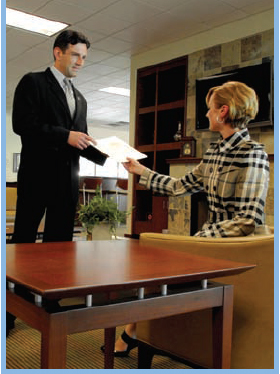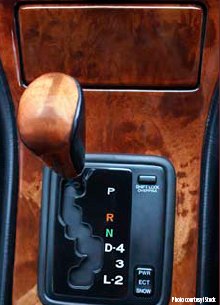News
The pursuit of pampering
The Lexus experience goes from the showroom to the waiting area. Result? Total luxury.
August 17, 2008
This article originally published in Retail Customer Experience magazine, Sep 2008. Click here to download a free PDF version.
 In 1989, the Toyota Motor Company debuted a new vehicle at the Detroit Motor Show — the LS 400. It was a single car that was the spearhead of the automaker's new luxury brand, Lexus.
In 1989, the Toyota Motor Company debuted a new vehicle at the Detroit Motor Show — the LS 400. It was a single car that was the spearhead of the automaker's new luxury brand, Lexus.
The LS 400 didn't stay lonely for long — today the company offers a dozen models in five categories and is a perennial winner of acclaim and awards from consumer reporter J.D. Power & Associates and the automotive press.
"When we launched this brand, it was all about luxury. It was always about personal service and attention," said Mike Meyer, vice president and general manager of Lexus of Louisville. A lifelong veteran of automobile retail, Meyer has been with the brand since Day 1. "When Lexus came onto the scene, they changed the landscape of the luxury car market. They made everybody step it up."
People like to feel special. When they get that feeling from a retailer, they will associate positive emotions with the act of shopping there. |
1. Offer a consistent brand experience
Lexus dealerships and service departments are typified by a consistency that makes customers feel at home, whether or not they actually are. "A Lexus store is distinctly recognized as a Lexus store, just from a drive-by," said Meyer. "From the very first impression, there's consistency."
That consistency is about more than just the showroom design, though; it goes all the way down to customer messaging and associate training. Meyer said everyone in his facility travels for training from the manufacturer once or twice a year. And it's not just the sales associates and managers who receive this training — it's everyone, including the service department and the clerical staff.
"You can't underestimate the value of face-to-face contact," said Sari Brown, founder of luxury handbag retailer Lux Couture. "In this technology age, it's too easy to communicate by e-mail or telephone. But real communication takes place in person. So, consistently meeting with salespeople in person should always be a priority."
 If face-to-face communication just isn't possible, be sure to use technology to make the conversation take place. "With the advent of webcams, it is entirely affordable and feasible to have weekly transmissions from 'the mothership,' and even landline feedback, that helps stores understand and emulate brand character and culture," said Paul Travis, management consultant and author of "Leadership on Demand."
If face-to-face communication just isn't possible, be sure to use technology to make the conversation take place. "With the advent of webcams, it is entirely affordable and feasible to have weekly transmissions from 'the mothership,' and even landline feedback, that helps stores understand and emulate brand character and culture," said Paul Travis, management consultant and author of "Leadership on Demand."
2. Become an educator
When it comes to stereotypes, probably no industry has fared worse than automotive sales.
Utter the phrase "car salesman" and the knee-jerk reactions you'll get likely will be negative — pushy, unscrupulous, untruthful and "anything for a dollar."
But, spend some time around Lexus' Meyer and his staff and you won't hear the phrase "car salesman." Instead, you'll hear "automotive specialist" or "client adviser."
"I try to get my sales team to understand that our goal is to have a customer for life," Meyer said. "My philosophy is, people don't change doctors every time they have an illness. They don't change attorneys every time they have a need to get into the judicial system. They don't change ministers every time they have a spiritual problem or need counseling. So why in the world wouldn't you find an automotive specialist that has your best interest in mind?"
That approach is classic "consultative selling," and it turns the traditional notion of car buying upside down: Instead of showing someone what you have and convincing him that it is right for him, you educate him on what is available and which options seem to be good matches for him.
"The customer feels more trust when the salesperson isn't pushy," Travis said. "People love to buy and hate to be sold."
Consultative selling moves beyond merely closing a transaction and sits squarely in the realm of relationship building. Those relationships take time, which makes it an approach that works better for some products than others.
"Our goal is to have a customer for life." — Mike Meyer vice president and general manager, Lexus of Louisville (Kentucky) |
3. Create a culture of listening
Remember that stereotypical salesperson mentioned earlier? Conjure him up in your head once again, for just a moment. Chances are, in your mental image, he is talking. A lot.
Lexus associates, on the other hand, are trained to be listeners. Meyer said good listening skills are a trait he looks for when hiring new associates, and that it comes more easily to some people than others — but it is essential for all of his people.
Fostering Brand Ambassadorship Messages often dissipate as distance increases. One of the most important things large retailers can do to fight this is to maintain constant communication between corporate and remote locations. Jenny Schade of brand consultancy JRS Consulting offers three tips on how headquarters can foster brand ambassadorship. 1. Get corporate employees out of the office and into the field. For example, McDonald's requires its executives to work in its restaurants one day each year. 2. Educate employees to reflect the brand. For example, The Body Shop brand is characterized by a strong commitment to being environmentally friendly. Company employees receive regular updates on the environment through training courses and newsletters, and are encouraged to share what they learn with others. 3. Recognize field employees who serve as brand advocates. American Airlines gives members of its frequent flier program certificates they can hand out to employees who deliver exceptional service. The employees can exchange the certificates for perks such as flight upgrades or a day off. — J.B. |
|
Second, a culture of listening creates a sales staff that can direct buyers to a product that will please them with less time and effort. Test-driving five cars can be exhausting and can turn the buyer off of the whole process. Having a conversation with an attentive auto expert, then being led to the vehicle that fits like a driving glove is a delight.
And finally, as Milton Pedraza, chief executive of the Luxury Institute, points out, careful listening allows a salesperson to pick up on unspoken needs, perhaps needs even the customer isn't aware of. A smart auto salesperson might notice a trend common among the four previous cars the buyer didn't like; a savvy electronics salesperson can infer things about a shopper's personality that will lead to a great product recommendation.
"It all starts with great listening skills," Pedraza said.
4. A place people want to be
As Meyer leads guests around his Lexus facility, he is understandably proud. Portions of it look more like a country club than an auto showroom. The second floor, in fact, is the "Lexus Club," an immaculate lounge with comfortable couches and chairs, a fireplace, a large-screen plasma TV and free Wi-Fi. In a nearby kitchen, a concierge keeps the bar stocked with fresh fruit, juice and snacks. A large window lets car owners look down on the pristine service department, where every tool is organized neatly and not a spot of grease is in sight.
Just around the corner from the kitchen is a high-tech golf simulator; next to it, a playroom for kids, and appropriately, next to that, a "quiet room," where a wearied executive could close the door and be alone while he waits for his vehicle to be serviced.
It's no surprise that during basketball season, Meyer had a client who dropped by after dinner one Saturday night, asking if he could just hang out for a while and watch the ball game. The answer, of course, was yes — because that's exactly the level of comfort Meyer tries to cultivate.
"Amenities can help the buyer have warm fuzzies about where they spend their money," Travis said. "McDonald's has long understood this, guiding franchisees to make a six-figure investment in play spaces to address the nonfinancial buyer — the kids."
For most retailers, the type and scope of amenities provided go hand-in-hand with the audience they are trying to court. Bloomingdale's and Kohl's both have experimented with park-your-husband lounges, comfortable sitting areas with TVs, beverages and magazines that take the edge off of a marathon clothes-shopping spree.
Robbie Baxter, an analyst and consultant with Peninsula Strategies, said companies that are trying to please moms need to cater to their kids. "That means grocery stores, clothing stores, hardware stores, most service providers," she said. "This could mean clean bathrooms with changing stations, a cozy toy and TV nook or even free retailer-themed coloring books. I'm shocked at how few retailers are mommy-friendly."
If customers will be spending time waiting for a product or service, amenities move from luxury to necessity; time spent waiting easily can turn into a negative experience, and retailers need a hedge against this possibility. In any instance where a wait is possible, Baxter said retailers should offer seating, an Internet connection and good reading materials at a minimum — and, preferably, food and drink.
"The No. 1 cause of emotional outbursts is hunger," she said. "A little snack and a pitcher of ice water go a long way. every preschool teacher knows that."

Photos by John Nation. Burberry trench coat and Stuart Weitzman shoes are courtesy of Rhodes For Her.
 ChatGPT
ChatGPT Grok
Grok Perplexity
Perplexity Claude
Claude





